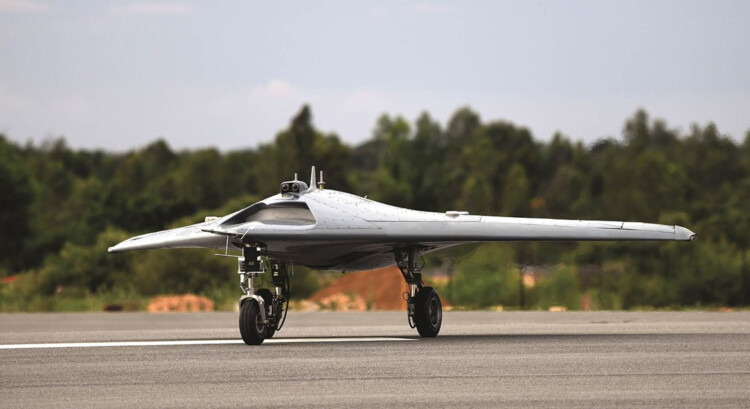Technology Gaps, Challenges in Transition
One immediate challenge arising from the prohibition of Chinese components is the disruption it has caused to the supply chain. Many Indian drone manufacturers were heavily reliant on Chinese-made parts, resulting in an increased cost of production due to the need to source components from other countries.
Sameer Joshi, founder of NewSpace Research and Technologies, highlighted that around 70 percent of the supply chain was previously rooted in China. The shift to alternative supply chains has led to an upward cost spiral in drone production, affecting the overall feasibility of domestic manufacturing.
DRDO Ghatak UCAV to be tested in 2025-26
It achieved its first flight in June 2020 seemingly reference the subscale SWIFT.
ADA will go for full-scale development of the #Ghatak UCAV (earlier known as AURA). It shall be a 1-tonne class UCAV carrying #DRDO SAAW, swarm drones Etc. pic.twitter.com/oFn4wZfTfT
— News IADN (@NewsIADN) January 13, 2023
Another challenge facing India’s drone industry stems from its dependence on foreign manufacturers for both components and entire drone systems. Its indigenous drone development capabilities are still in the infant stage, and there’s a technology gap that hampers the creation of certain drone types. The delays in producing an indigenous Medium Altitude Long Endurance (MALE) drone system highlight the complexity of drone development and the obstacles that can arise.
However, amidst these challenges, there are significant opportunities for growth and development. The ban on Chinese components has underscored a silver lining of the need for self-reliance in drone technology and manufacturing. By fostering indigenous research and development, India can bridge technology gaps and cultivate a robust ecosystem of expertise. This transition could lead to advancements in drone technology, spurring innovation and greater autonomy.
The Role of Government and Private Industry
The Indian government has a pivotal role in nurturing the homegrown drone industry. As evidenced by the budget allocation for defense research and development, there’s an increasing emphasis on supporting the private sector. For this fiscal year alone, the country has set aside 1.6 trillion rupees (around $19.77 billion) for military modernization, of which 75 percent is reserved for domestic industry, according to Reuters.
Finance Minister Nirmala Sitharaman’s commitment to allocating a quarter of the defense research and development budget for private sector involvement demonstrates a commitment to promoting innovation and self-sufficiency.
TAPAS took off at 07.35hrs from Aeronautical Test Range (ATR), Chitradurga which is 285 km from karwar naval base. One Ground Control station (GCS) and two Ship Data Terminal (SDT) were installed in INS Subhadra for controlling the UAV. After trial TAPAS landed back at ATR. pic.twitter.com/MfGRDUjI5U
— DRDO (@DRDO_India) June 18, 2023
However, it’s important to note that significant challenges remain in encouraging private-sector investment in drone research and development. Venture capitalists often hesitate to invest in military projects due to extended lead times and the inherent risk of such endeavors. To cultivate a thriving innovation ecosystem, the government must provide a conducive environment for research and development, ensuring that the potential rewards balance the risks of investment.
Balancing National Security and Economic Considerations
While the decision to bar Chinese-made components in military drones is primarily motivated by security concerns, it also has economic ramifications. The cost of domestic drone manufacturing has increased, and it’s essential for India to strike a balance between safeguarding national security and ensuring the economic viability of its drone industry.
As a senior defense official highlighted in the report, transitioning from buying equipment from China to domestically manufacturing those components might lead to a 50 percent cost increase. This underscores the need for comprehensive planning and a long-term vision considering both security imperatives and economic feasibility.
Forging a Self-Reliant and Secure Future
India’s recent steps to restrict Chinese-made components in military drones are emblematic of the nation’s efforts to enhance its defense capabilities while securing its interests. These measures signal a shift toward self-reliance, innovation, and the safeguarding of sensitive military technologies. While the challenges are substantial, including disruptions in the supply chain and technology gaps, they offer a unique opportunity for India to emerge as a leader in drone technology.
By leveraging its burgeoning private sector and fostering a supportive ecosystem for research and development, India can bridge the technology gaps and achieve a balanced approach to national security and economic prosperity. The journey ahead requires strategic planning, collaboration between the public and private sectors, and a commitment to nurturing innovation—an investment that could propel India’s drone industry to new heights on the global stage.










COMMENTS